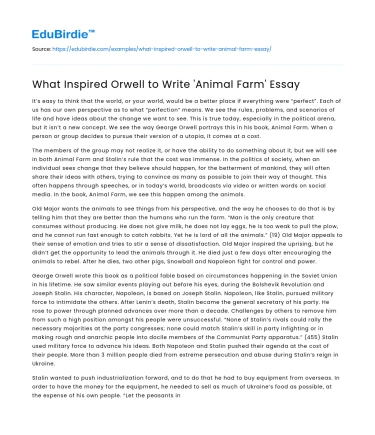It’s easy to think that the world, or your world, would be a better place if everything were “perfect”. Each of us has our own perspective as to what “perfection” means. We see the rules, problems, and scenarios of life and have ideas about the change we want to see. This is true today, especially in the political arena, but it isn’t a new concept. We see the way George Orwell portrays this in his book, Animal Farm. When a person or group decides to pursue their version of a utopia, it comes at a cost.
The members of the group may not realize it, or have the ability to do something about it, but we will see in both Animal Farm and Stalin’s rule that the cost was immense. In the politics of society, when an individual sees change that they believe should happen, for the betterment of mankind, they will often share their ideas with others, trying to convince as many as possible to join their way of thought. This often happens through speeches, or in today’s world, broadcasts via video or written words on social media. In the book, Animal Farm, we see this happen among the animals.
Save your time!
We can take care of your essay
- Proper editing and formatting
- Free revision, title page, and bibliography
- Flexible prices and money-back guarantee
Old Major wants the animals to see things from his perspective, and the way he chooses to do that is by telling him that they are better than the humans who run the farm. “Man is the only creature that consumes without producing. He does not give milk, he does not lay eggs, he is too weak to pull the plow, and he cannot run fast enough to catch rabbits. Yet he is lord of all the animals.” (19) Old Major appeals to their sense of emotion and tries to stir a sense of dissatisfaction. Old Major inspired the uprising, but he didn’t get the opportunity to lead the animals through it. He died just a few days after encouraging the animals to rebel. After he dies, two other pigs, Snowball and Napoleon fight for control and power.
George Orwell wrote this book as a political fable based on circumstances happening in the Soviet Union in his lifetime. He saw similar events playing out before his eyes, during the Bolshevik Revolution and Joseph Stalin. His character, Napoleon, is based on Joseph Stalin. Napoleon, like Stalin, pursued military force to intimidate the others. After Lenin’s death, Stalin became the general secretary of his party. He rose to power through planned advances over more than a decade. Challenges by others to remove him from such a high position amongst his people were unsuccessful. “None of Stalin’s rivals could rally the necessary majorities at the party congresses; none could match Stalin’s skill in party infighting or in making rough and anarchic people into docile members of the Communist Party apparatus.” (455) Stalin used military force to advance his ideas. Both Napoleon and Stalin pushed their agenda at the cost of their people. More than 3 million people died from extreme persecution and abuse during Stalin’s reign in Ukraine.
Stalin wanted to push industrialization forward, and to do that he had to buy equipment from overseas. In order to have the money for the equipment, he needed to sell as much of Ukraine’s food as possible, at the expense of his own people. “Let the peasants in the Ukrainian breadbasket starve so that the country could grow strong!” (457) He believed in industrialization at all costs, even when that cost meant the starvation of his own people. We see a similar situation in Animal Farm, “In January food fell short. The corn ration was drastically reduced, and it was announced that an extra potato ration would be issued to make up for it. Then it was discovered that the greater part of the potato crop had been frosted in the clamps, which had not been covered thickly enough. The potatoes had become soft and discolored, and only a few were edible. For days at a time, the animals had nothing to eat but chaff and mangels.
Starvation seemed to stare them in the face.” (44) It is easy to see that George Orwell does not favor the concept of a utopia. In particular, he did not agree with Stalin’s cause and the cost. Orwell showed the dangers of Stalinism in a way that everyone could understand. Stalin’s ideas were based on a foundational lack of respect for life. “Stalin was untroubled by the waste of life. He believed that without the total obedience of the Russian people, the Soviet economy could not be effectively and quickly mobilized and that the terror was necessary to compel compliance.” (459) For the animals on the farm, “They were generally hungry, they slept on straw, they drank from the pool, they labored in the fields; in winter they were troubled by the cold, and in summer by the flies.” (77) Nothing about their lives was better in the end than it was in the beginning. The concept of a perfect society is not valid, and it is not attainable. George Orwell recognized this. He saw the way Stalin used force, abuse, and death to force his will on the people.
Stalin’s perspective of perfection was not positive, helpful, or anything close to perfect for the people beneath him. Similarly, Napoleon abuses, the animals, he withholds food, reduces their living conditions, and strips them of all personal freedoms. George Orwell takes a simplistic concept, a story about farm animals, and brings life to the living conditions of the people who suffered under Stalin’s reign. Perfection on earth is not possible, because it is swayed and forced by imperfect people.






 Stuck on your essay?
Stuck on your essay?

